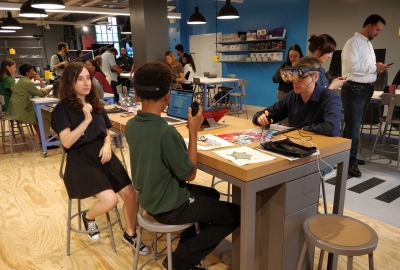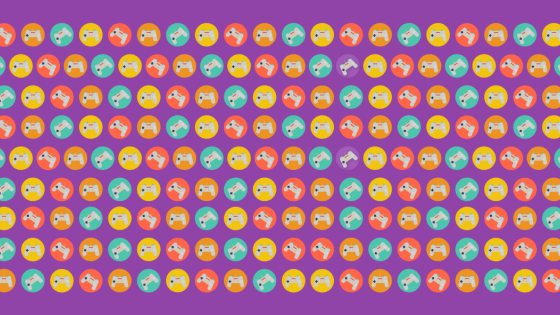
Goals
The goal of the workshop is to convene researchers and practitioners in Learning Analytics and Educational Data Mining for educational simulations and games to discuss issues related to the collection and analysis of data generated during learning from these environments. The overall focus is to devise analysis methods for intensive data to enhance extensive data analysis (and vice versa).
Specific topics discussed
- Assessment mechanics–design of learning activities that produce meaningful data
- Data Visualization Techniques for Multiple Data Streams
- Analysis of multiple synchronized streams of continuous data
- Data Mining for Behavior Modeling
Description of Breakout Group Tasks and Outcomes
The goal of the breakout group meetings is to open discussion on a number of key questions:
- What research interests do we share?
- What relevant projects do we have going on?
- What research questions would we like to investigate?
- What should be our priorities?
- With whom can we/should we partner?
Outcomes may include
- Reports that contribute to a white paper (could be turned into edited book)
- Conceptualization of a data repository and visualization/analysis system for large data sets from simulations/games
- Ideas for joint research projects and collaborations
The topics for the breakout groups are:
- Assessment mechanics: How can we design learning activities that produce meaningful data?
- Data Visualization Techniques for Multiple Data Streams
- Analysis of multiple synchronized streams of continuous data
- Data Mining for Behavior Modeling
The process of the breakout group work consists of six phases
- Breakout group discussion of key questions
- Report on breakout group discussions in Plenary Session
- Cross-group idea exchange (Plenary)
- Reconfigured Groups: Discuss specific ideas
- Synthesis of discussions and plans for the future (Plenary)
- Post-workshop work
Agenda: Thursday
Phase 1 – Broad Discussion of Ideas
Group Tasks. Please use this group session to discuss:
- What research interests do you have, and which do we share?
- What related projects are you working on?
- What research questions would you like to investigate?
- Which will have the most impact? What should be our priorities?
- What are the theoretical prerequisites and/or implications of this work?
Phase 2 – Report to Plenary
Tasks
- Group facilitators: report key points of breakout group discussions to Plenary
- Participants: In preparation of tomorrow’s sessions, come up with questions from your field/perspective that inspire discussion by one or more of the other groups
- Participants: About 50% of group members will rotate to another group. You may use the form in your workshop folder to request another group to join the next day.
Agenda: Friday
Phase 3 – Cross Group Idea Exchange (Plenary)
Tasks (15 min per group)
- Group Facilitators give 2-3 min. summaries of key ideas from Phase 1.
- Participants pose questions from their field/perspective to inspire discussion by another group (outcome of Phase 2).
- Facilitators take note of these questions, to be discussed in Phase 4.
Phase 4 – Reconfigured Groups: Discuss Specific Ideas and Report to Plenary
Group Charge: Reconfigured groups continue discussion:
- What are your research interests and related projects are you working on?
- Which research questions should be addressed (high impact)?
- How do questions or report items from other group(s) impact our discussion?
- What practical questions related to actual projects or data sets do we need to consider?
- With whom do we want to partner?
Phase 5 – Post Breakout Group Connecting Discussions (Plenary)
Tasks
- How can we synthesize the discussions of our different groups?
- What’s next?
- Topic for next workshop
- Edited volume?
- Joining of existing projects
- Development of new projects
- New partners to connect with
Participants
Bruce Homer (organizer)
Associate Professor, Educational Psychology
Graduate Center, The City University of New York
bhomer@gc.cuny.edu | http://brucehomer.ws.gc.cuny.edu
Jan L. Plass (organizer)
Paulette Goddard Professor of Digital Media and Learning Sciences
New York University
jan.plass@nyu.edu | @janplass | http://create.nyu.eduhttp://g4li.org
Ryan Baker (organizer)
Julius and Rosa Sachs Distinguished Lecturer
Columbia University Teachers College
baker2@exchange.tc.columbia.edu
Suzy Letourneau (organizer)
Post Doctoral Scholar
New York University
suzy.letourneau@gmail.com
Melissa Biles (organizer)
Doctoral Student
New York University
melissa.biles@nyu.edu
Rich Bonneau
New York University
rb133@nyu.edu
Jen Case
Graduate Center, The City University of New York
jenelily@gmail.com
Sayamindu Dasgupta
MIT Media Lab
sayamindu@media.mit.edu | @sayamindu | http://www.mit.edu/~sdg1/
Girlie Delacruz
Senior Researcher
CRESST National Center for the Research on Standards and Student Testing and Student, UCLA
gdelacruz@cse.ucla.edu
Howard Everson
Professor of Educational Psychology
Director, Center for Advanced Study in Education
Graduate Center, The City University of New York
HEverson@gc.cuny.edu
Martha Hadley
Michael Cohen Research Group, New York
MHadley@mcgrc.com
Chris Hoadley
Associate Professor and Co-Director of Educational Technology Programs
New York University
tophe@nyu.edu
Katherine Isbister
Associate Professor, jointly appointed between NYU-Poly Computer Science and NYU Tisch Game Center
katherine.isbister@gmail.com
Walter Kaczetow
The Graduate Center, CUNY
WKaczetow@gc.cuny.edu
Deirdre Kerr
CRESST National Center for the Research on Standards and Student Testing and Student, UCLA
de_kerr@hotmail.com | http://www.linkedin.com/in/deirdrekerr
Charles Kinzer
Teachers College Columbia University
kinzer@tc.columbia.edu
Detlev Leutner
Professor of Instructional Psychology
Duisburg-Essen University, Essen, Germany
detlev.leutner@uni-due.de
Jaclyn Ocumpaugh
Post Doctoral Scholar
TC Columbia
Jocumpaugh@wpi.edu
Jenna Olsen
Utah State University
Ken Perlin
Professor of Computer Science
New York University
ken.perlin@gmail.com
Ruth Schwartz
New York University
ruth.schwartz@nyu.edu
John Stamper
Human-Computer Interaction Institute
Carnegie Mellon University
jstamper@cs.cmu.edu | http://dev.stamper.org | http://pslcdatashop.org
Claudio Silva
Professor of Computer Science and Engineering
NYU – POLY
Head of Disciplines, NYU CUSP
csilva@nyu.edu | http://bigdata.poly.edu/~csilva | http://cusp.nyu.edu
Cathy Tran
University of California, Irvine
ctran27@gmail.com | @cathytran | http://www.gse.uci.edu/person/tran_c/tran_c_bio.php
Matthew Ventura
Senior Research Scientist
College of Education, Florida State University
mventura@fsu.edu
Jay Verkuilen
Graduate Center, The City University of New York
JVerkuilen@gc.cuny.edu
Katherine Yoshida
Michael Cohen Group
kyoshida@mcgrc.

